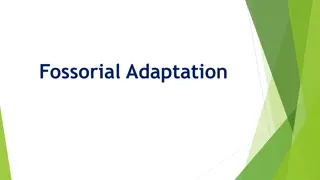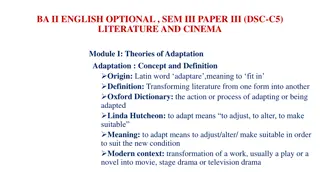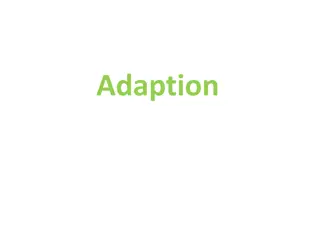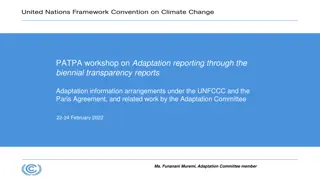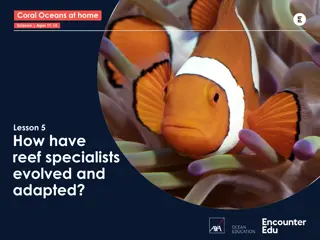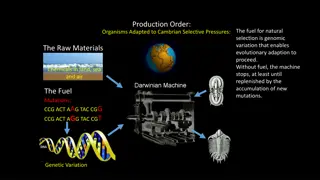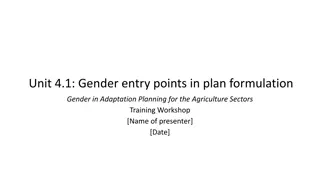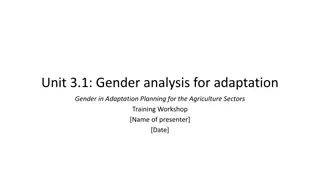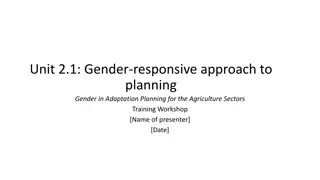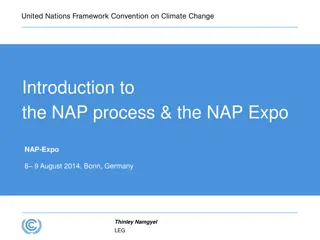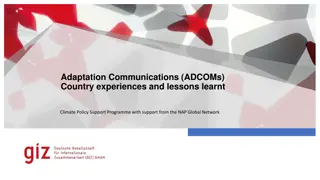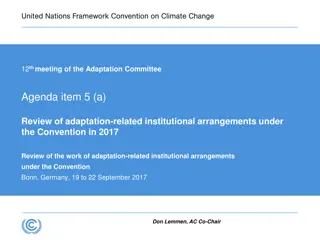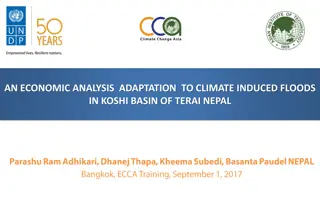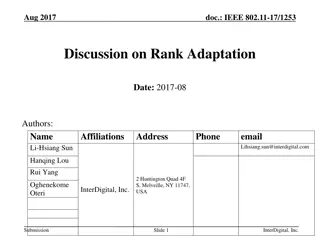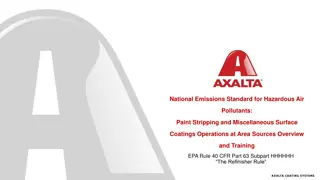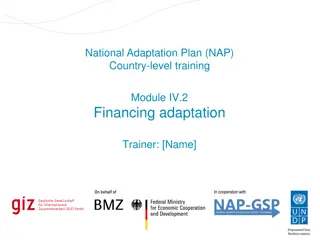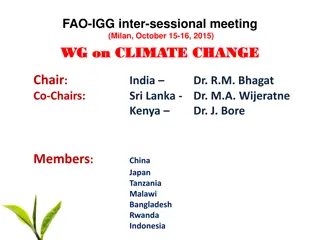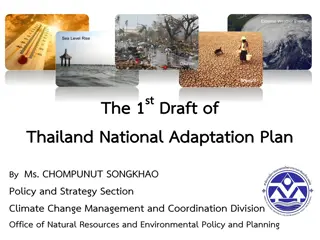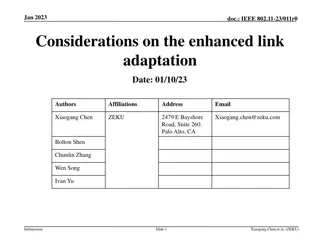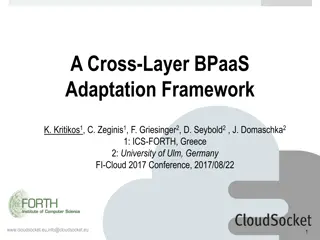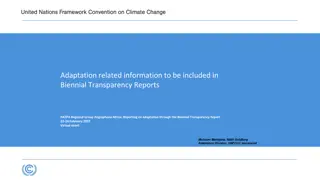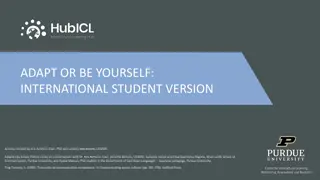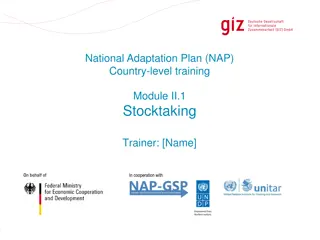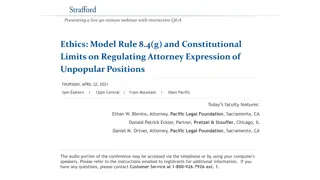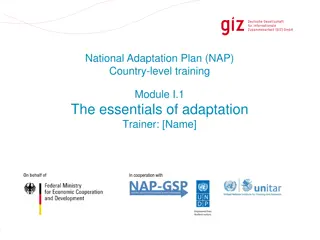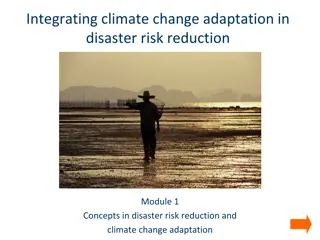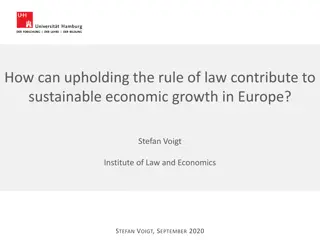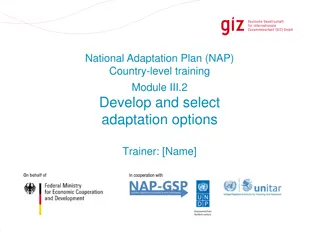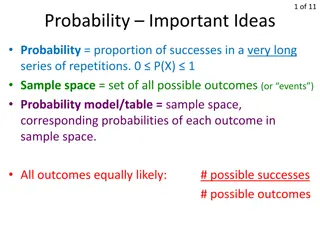Understanding the Urgency of Adaptation Planning and Financing for Climate Change
Exploring the critical need for adaptation planning and financing through National Adaptation Plans (NAPs) and Nationally Determined Contributions (NDCs) to address the adverse impacts of climate change. The content highlights the gaps, challenges, and the widening finance deficit in developing coun
2 views • 21 slides
Climate Change Adaptation Toolbox for Schools and Communities
Climate Change Adaptation Toolbox offers resources to understand and address the impacts of climate change on schools and communities. It provides information on changing climates, implications, and actionable steps to mitigate risks. The toolbox supports education on climate change and facilitates
5 views • 6 slides
Sustainable Financing for Climate Adaptation: Mexico's Innovative Approach
Mexico's Ministry of Finance is pioneering sustainable financing for climate adaptation through policy instruments like the Sustainable Taxonomy. The country's focus on mobilizing financing for adaptation, in line with NAPs and NDCs, showcases a unique global leadership in incorporating social objec
5 views • 4 slides
Gaps and Guidance for National Adaptation Plans (NAP-GGGP)
The University of Twente and the Global Green Growth Institute present a comprehensive study on National Adaptation Plans (NAP-GGGP) focusing on best practices, guidelines for development, and lessons from plan evaluations at local levels. The NAP-GGGP framework includes 7 categories with 56 element
3 views • 10 slides
Pascal's Rule in NMR Spectroscopy ( n+1 )
Pascal's Rule in NMR spectroscopy, also known as the (N+1) rule, is an empirical rule used to predict the multiplicity and splitting pattern of peaks in 1H and 13C NMR spectra. It states that if a nucleus is coupled to N number of equivalent nuclei, the multiplicity of the peak is N+1. The rule help
1 views • 30 slides
Understanding Fossorial Adaptation in Animals
Animals adapt to subterranean environments through anatomical and physiological modifications in a process known as fossorial adaptation. This adaptation involves creating subterranean zones through digging, leading to changes influenced by both the environment and the animals themselves. Fossorial
0 views • 17 slides
Theories of Adaptation in Literature and Cinema
The concept of adaptation involves transforming literature from one form to another, such as from a play or novel into a movie or television drama. Various approaches and theories of adaptation exist, including perspectives from theorists like Linda Hutcheon, Bela Balazs, and Andre Bazin. These theo
0 views • 9 slides
Exploring Darwin's Theory of Adaptation Through Finch Beaks
Explore the concept of adaptation through Charles Darwin's observations of finches' beak variations on different Galapagos islands. Discover how finches have evolved to match the size of seeds they eat and how their beak shapes differ based on their food sources. Learn about the significance of spec
0 views • 13 slides
Understanding Fleming's Left Hand Rule and Electric Motors
Fleming's Left Hand Rule, also known as the Left Hand Rule for Motors, explains the interaction between charged particles and magnetic fields. Electric motors utilize this principle to convert electrical energy into mechanical energy through the interaction of magnetic fields and current-carrying co
2 views • 6 slides
Workshop on Adaptation Reporting under the UNFCCC and Paris Agreement
Workshop on Adaptation Reporting through the Biennial Transparency Reports and related work by the Adaptation Committee under the UNFCCC and the Paris Agreement, focusing on arrangements for reporting and communicating adaptation information. The workshop covers various initiatives, guidelines, and
0 views • 7 slides
Exploring Adaptations of Reef Specialists
Delve into the evolution and adaptation of reef specialists in Lesson 5 of Coral Oceans at Home Science for ages 11-14. Discover specific adaptations used by coral reef species, the necessity of adaptation for survival, diverse adaptation strategies on the reefs, and create the ultimate coral animal
0 views • 20 slides
Insights into Evolutionary Adaptation and Genetic Variation
The production order highlights the essential role of genomic variation as fuel for natural selection, driving evolutionary adaptation. The Cambrian Explosion timeframe reveals a rapid increase in evolutionary adaptation, showcasing the appearance of diverse animal phyla over a relatively short peri
5 views • 6 slides
Gender-Responsive Adaptation Planning in Agriculture Sectors
This workshop explores gender entry points in plan formulation for agriculture adaptation, emphasizing the importance of considering gender differences. It discusses key characteristics of gender-responsive plans, actions to ensure gender inclusion, and potential risks of neglecting gender perspecti
0 views • 12 slides
Gender Analysis for Adaptation in Agriculture Sectors: Understanding and Implementation
Gender analysis in adaptation planning for agriculture sectors is essential to address gender inequalities, discrimination, and power dynamics. It helps identify how women and men are affected differently by climate impacts, enabling tailored solutions to meet varying needs and constraints. By incor
5 views • 10 slides
Gender and Climate Change in Agriculture: Impacts and Adaptation Strategies
This workshop explores the intersection of gender and climate change in agriculture, emphasizing the importance of considering gender dynamics in adaptation planning. It covers the effects of climate change on men and women in agriculture, reasons for gender-sensitive adaptation planning, global and
0 views • 10 slides
Gender-Responsive Approach to Adaptation Planning in Agriculture
This workshop explores the importance of gender-responsive adaptation planning in the agriculture sector, focusing on key elements of good governance, principles of gender equality, and approaches to address gender disparities in adaptation practices. The emphasis is on equitable participation, reso
0 views • 9 slides
Climate Change Adaptation Programming Strategy and Priorities
This content discusses the Climate Change Adaptation programming strategy, goals, and thematic priorities for vulnerable developing countries. The strategy aims to increase resilience to climate change impacts through long-term measures, strengthen capacities, and integrate adaptation into policies
2 views • 6 slides
Understanding the National Adaptation Plan Process
The National Adaptation Plan (NAP) process, established in 2010, aims to help Least Developed Countries (LDCs) formulate and implement NAPs to address medium- and long-term adaptation needs. Guidelines for NAP formulation and implementation have been provided, with a focus on reducing vulnerability
0 views • 11 slides
Understanding Adaptation Communications in Climate Policy Support Programs
Adaptation Communications (ADCOMs) play a crucial role in the implementation of the Paris Agreement by enabling countries to report on their adaptation priorities, plans, and support needs without burdening developing country Parties. ADCOMs serve to enhance visibility, strengthen adaptation actions
2 views • 13 slides
Review of Adaptation-Related Institutional Arrangements Under the Convention in 2017
The 12th meeting of the Adaptation Committee in Bonn, Germany, focused on reviewing adaptation-related institutional arrangements under the Convention in 2017. Recommendations were made to enhance coherence and respond to the evolving needs of Parties, including assigning future work to existing ins
0 views • 4 slides
Economic Analysis of Climate-Induced Flood Adaptation in Koshi Basin, Nepal
This project aims to assess the impact of climate-induced floods on agriculture in the Koshi basin of Terai, Nepal. By evaluating flood risk, economic costs, and different adaptation options, the study seeks to enhance resilience in the face of increasing flood occurrences catalyzed by climate chang
0 views • 9 slides
The Role of the Adaptation Committee in Promoting Adaptation Technologies
The Adaptation Committee serves as an advisory body focusing on enhancing adaptation actions under the Convention. It aims to provide support, share information, promote synergy, and offer recommendations to incentivize adaptation actions. The committee's ambitious three-year work plan includes acti
0 views • 7 slides
Cultural Adaptation: Understanding Culture Shock and the Adaptation Process
Cultural adaptation involves facing culture shock when living abroad, experiencing various symptoms like homesickness and conflict, understanding cultural variations in body language and perceptions, and going through stages of adaptation from fun and excitement to biculturalism. Tips and insights a
0 views • 17 slides
Discussion on Rank Adaptation for SU-MIMO Transmission in IEEE 802.11-17/1253
MIMO transmission in IEEE 802.11ay supports up to 8 data streams with a focus on SU-MIMO. The need for efficient rank adaptation procedures and corresponding signaling mechanisms is highlighted. The document addresses rank adaptation procedures, example implementations, challenges faced, and propose
0 views • 6 slides
EPA Rule 40 CFR Part 63 Subpart HHHHHH Overview
EPA Rule 40 CFR Part 63 Subpart HHHHHH, also known as The Refinisher Rule, sets standards for hazardous air pollutants in paint stripping and surface coatings operations. The rule aims to control emissions of target hazardous air pollutants in collision centers and surrounding areas. It outlines req
0 views • 20 slides
Understanding Climate Financing for Adaptation: NAP Country-Level Training
Explore Module IV.2 on financing adaptation in National Adaptation Plans (NAP). Learn about tracking climate financing, determinants of financing strategies, potential funding sources, and activities that require funding for adaptation. Discover the Climate Public Expenditures and Institutional Revi
0 views • 17 slides
Climate Change Impact Analysis and Adaptation Strategies in WG Meeting
In the FAO-IGG inter-sessional meeting of October 2015 in Milan, WG on Climate Change discussed data collection, vulnerability analysis, and adaptation strategies. They focused on climate trends, impact analysis, adaptation projections, and strategies like tree establishment, crop diversification, a
0 views • 21 slides
Thailand National Adaptation Plan for Climate Resilience
Thailand's National Adaptation Plan focuses on building resilience to climate change impacts through strategic frameworks, guidelines, and financial allocation. It aims to integrate climate adaptation measures across sectors like water management, agriculture, tourism, public health, natural resourc
0 views • 14 slides
Enhancements in Link Adaptation for IEEE 802.11 Standards
Discussions in the Jan. 2023 document focus on enhanced link adaptation considerations for IEEE 802.11 standards, particularly in 11be and 11ax. Various improvements and challenges in link adaptation are highlighted, emphasizing the need for enhanced link adaptation (ELA) to address issues like inte
0 views • 14 slides
A Cross-Layer BPaaS Adaptation Framework Overview
This framework addresses the problematic issues of flexibility and cost reduction in Business Processes as a Service (BPaaS) by monitoring and adapting BPaaS in a cross-layer manner. It focuses on handling the entire lifecycle of BPaaS and covers adaptation mechanisms for different layers in the clo
0 views • 17 slides
Reporting on Adaptation in Biennial Transparency Reports: Insights from Anglophone Africa
Explore the integration of adaptation-related information in Biennial Transparency Reports for Anglophone Africa, presented during a virtual event. Learn about key guidelines, criteria, and potential synergies between National Adaptation Plans and Biennial Transparency Reports to enhance effectivene
0 views • 10 slides
Understanding Adaptation Across Cultures
Explore the concept of adaptation in diverse cultural contexts, discussing the importance of adapting, decision-making processes, and the impact of adaptation. Engage in introspective activities to enhance transcultural communication competence. Derived from Ting-Toomey's work, delve into personal e
0 views • 38 slides
National Adaptation Plan (NAP) Stocktaking Training Overview
This training module provides insights into the importance of stocktaking in the National Adaptation Plan (NAP) process. Participants will learn about different stocktaking methods, utilizing stocktaking results for NAP development, and identifying gaps and needs. The session covers subjects like po
0 views • 14 slides
Ethics & Constitutional Limits on Attorney Expression Webinar
Join the live 90-minute webinar on Ethics: Model Rule 8.4(g) and Constitutional Limits on Regulating Attorney Expression of Unpopular Positions featuring expert faculty members. Explore regulations governing lawyer speech and the requirements for lawyer communication in various contexts. Learn about
0 views • 57 slides
Essential Training on National Adaptation Planning
This training module focuses on enhancing understanding and capacities for National Adaptation Planning (NAP) processes. It covers the basics of climate change, adaptation concepts, challenges, and the importance of adaptation for development. Through interactive sessions and case studies, participa
0 views • 16 slides
Integrating Climate Change Adaptation in Disaster Risk Reduction Module 1
Welcome to the e-Learning module on integrating climate change adaptation in disaster risk reduction. This module covers concepts in disaster risk reduction and climate change adaptation. It is part of a package that includes five modules focusing on vulnerability, disaster risk reduction, climate c
0 views • 29 slides
Upholding the Rule of Law for Sustainable Economic Growth in Europe
Democracy and the rule of law are essential for sustained economic growth in Europe. The rule of law ensures stable and impartial enforcement of rules such as property rights and contract law, key for market economies. Upholding the rule of law is crucial for combating corruption and maintaining a f
0 views • 6 slides
Climate Change Adaptation Programming Strategies and Priorities
This content discusses the Global Environment Facility's (GEF) programming for climate change adaptation, focusing on strategies, funding sources, and thematic priorities. It outlines the goals, objectives, and core pillars of adaptation programming, emphasizing the integration of climate change ada
0 views • 11 slides
Developing and Selecting Adaptation Options in National Adaptation Plans: A Training Module
This training module focuses on the importance of selecting and prioritizing adaptation options in the National Adaptation Plan (NAP). It covers different assessment approaches, criteria for selecting options, decision support tools like Cost-benefit Analysis (CBA), and the necessity of prioritizing
0 views • 15 slides
Understanding Probability: Key Concepts and Rules
Probability is the proportion of successes in a long series of repetitions. Important ideas include the 0-1 Rule, the 100% Rule, the Complement Rule, the Addition Rule, and the Multiplication Rule. These rules govern the calculation of probabilities in various scenarios. Learn the fundamental princi
0 views • 16 slides





